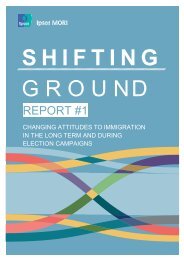Create successful ePaper yourself
Turn your PDF publications into a flip-book with our unique Google optimized e-Paper software.
Ties <strong>that</strong> Bind<br />
47 Geoffrey Bennet, Naval battles<br />
of the First World War (London,<br />
1974)<br />
48 CAB/23/6, National Archives,<br />
London.<br />
49 CAB/24/50, National Archives,<br />
London.<br />
50 CAB/24/54, National Archives,<br />
London.<br />
51 CAB/23/6, National Archives,<br />
London<br />
52 Curzon papers on admission of<br />
Indians to the major ranks of the<br />
Army, Mss. Eur. F/<strong>11</strong>1/442, IOR,<br />
BL, London.<br />
20 | policyexchange.org.uk<br />
India. Although a long way from the main theatres of war, the Indian home front<br />
was not immune to the conflict. In 1914-1915, the south-eastern coast town of<br />
Madras came under sustained German shelling from the Seiner Majestät Schiff (SMS)<br />
Emden – a light cruiser from the Imperial Navy – causing death, injury and<br />
widespread damage to infrastructure. 47 Indians therefore wanted to create an<br />
army dedicated to pursuing their national interest, with one leader telling the<br />
Viceroy, ‘we rely upon you to defend us, but we see your great and numerous<br />
preoccupations elsewhere, and we want to learn how to defend ourselves and<br />
how to help you more’. 48<br />
By April 1918, General Sir Charles Monro, the Commander-in-Chief of the<br />
Indian Army, similarly felt a force was needed to safeguard India against the<br />
possibility of a German-Ottoman invasion. He consequently told London <strong>that</strong> he<br />
proposed to create two divisions, three infantry brigades, and six cavalry<br />
regiments for the specific purpose of defending India, which he planned to<br />
station just outside the Khyber Pass. 49 Disagreements continued between the War<br />
Office and Commander-in-Chief over whether this was necessary, although the<br />
latter persisted until it was easier for Whitehall to simply concede to his demands.<br />
In the meantime, India was also reassured <strong>that</strong> were it to suffer an attack, more<br />
troops would immediately be made available for its defence. Yet this was not the<br />
national army Indians had been hoping for and, as their requests continued to fall<br />
on deaf ears, the Viceroy acknowledged there had been ‘a marked diminution in<br />
the belief in our sincerity and honesty of purpose’. 50<br />
Indians also resented the government’s refusal to award them commissions,<br />
even on a temporary basis. 51 Most Indians were deemed by the British to be unfit<br />
to be officers, and there were fears <strong>that</strong> European soldiers might be unwilling to<br />
take orders from them. It accentuated fears among some Indians <strong>that</strong> they were<br />
fighting for an ungrateful Empire whose interests did not always match their own.<br />
They continued, however, to push for commissions throughout the war. In July<br />
1917 the War Office warned:<br />
[The Army Council] have warned <strong>that</strong> to grant commissions to natives of India would entail<br />
a great risk from the military point of view, in <strong>that</strong> it involves placing native Indians in a<br />
position where they would be entitled to command European Officers. 52<br />
Yet by the following month, plans were agreed in principle for some Indian<br />
officers to be commissioned, although this did not actually happen until after the<br />
war was over. Shortly after the conflict ended, Edwin Montagu, Secretary of State<br />
for India, told Parliament <strong>that</strong> ‘commissions are going to be given to efficient<br />
soldiers, subject to His Majesty's approval’, through one of four categories:<br />
1. A certain number of substantive King’s commissions in the Indian Army to selected<br />
Indian officers who have specially distinguished themselves in the present War.<br />
2. A certain number of King's commissions conferring honorary rank in the<br />
Indian Army to selected Indian officers who have rendered distinguished<br />
service not necessarily during the present War, and who, owing to age or lack<br />
of educational qualifications are not eligible for substantive King’s<br />
commissions. Such honorary commissions will carry with them special<br />
advantages in respect of pay and pension.



